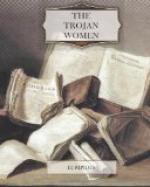This Menelaus, however, is rather different from the traditional Menelaus. Besides being the husband of Helen, he is the typical Conqueror, for whose sake the Greeks fought and to whom the central prize of the war belongs. And we take him at the height of his triumph, the very moment for which he made the war! Hence the peculiar bitterness with which he is treated, his conquest turning to ashes in his mouth, and his love a confused turmoil of hunger and hatred, contemptible and yet terrible.
The exit of the scene would leave a modern audience quite in doubt as to what happened, unless the action were much clearer than the words. But all Athenians knew from the Odyssey that the pair were swiftly reconciled, and lived happily together as King and Queen of Sparta.
[37] Thou deep base of the world.]—These lines, as a piece of religious speculation, were very famous in antiquity. And dramatically they are most important. All through the play Hecuba is a woman of remarkable intellectual power and of fearless thought. She does not definitely deny the existence of the Olympian gods, like some characters in Euripides, but she treats them as beings that have betrayed her, and whose name she scarcely deigns to speak. It is the very godlessness of Hecuba’s fortitude that makes it so terrible and, properly regarded, so noble. (Cf. p. 35 “Why call on things so weak?” and p. 74 “They know, they know....”) Such Gods were as a matter of fact the moral inferiors of good men, and Euripides will never blind his eyes to their inferiority. And as soon as people see that their god is bad, they tend to cease believing in his existence at all. (Hecuba’s answer to Helen is not inconsistent with this, it is only less characteristic.)
Behind this Olympian system, however, there is a possibility of some real Providence or impersonal Governance of the world, to which here, for a moment, Hecuba makes a passionate approach. If there is any explanation, any justice, even in the form of mere punishment of the wicked, she will be content and give worship! But it seems that there is not. Then at last there remains—what most but not all modern freethinkers would probably have begun to doubt at the very beginning—the world of the departed, the spirits of the dead, who are true, and in their dim way love her still (p. 71 “Thy father far away shall comfort thee,” and the last scene of the play).
This last religion, faint and shattered by doubt as it is, represents a return to the most primitive “Pelasgian” beliefs, a worship of the Dead which existed long before the Olympian system, and has long outlived it.
[38] The fire-brand’s image.]—Hecuba, just before Paris’ birth, dreamed that she gave birth to a fire-brand. The prophets therefore advised that the babe should be killed; but Priam disobeyed them.




